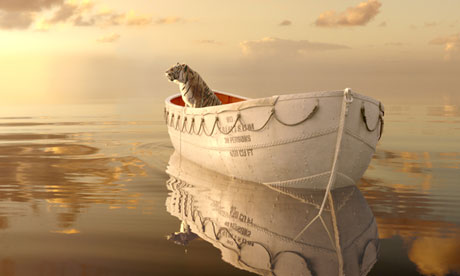
In Life of Pi, it's the English actor who is drafted in to speak up for the film's internationalist credentials. "So far we have an Indian boy named after a French swimming pool on a Japanese ship full of animals heading off to Canada," the writer played by Rafe Spall says, just before the ordeal on the high seas begins. Or in the words of Paul Hanneman, co-president of international distribution at Fox: "This is truly a global picture. You've got multiple religions; it starts in India and ends in Mexico; but most of the movie takes place on the ocean, so it's really any man and anywhere."
But it's in Asia that the impact of Ang Lee's film – fast approaching the $400m mark worldwide – has been truly felt. Among the mostly strong figures in territories across the region were two standout performances: $13m in India, where local star Irrfan Khan and a $1m marketing spend – the highest ever in distributor Fox Star India's history – helped the film punch its weight against Bollywood; and over $90m in China, where it become only the second US film, after Titanic 3D, to gross more than in North America. Chinese filmgoers flocked to social media to debate Lee's film fable: more than five million messages were exchanged, discussing the meaning of the carnivorous island and the open ending, on Sina Weibo, the country's Twitter equivalent.
"I didn't realise the movie really has an Asian vibe," Lee claimed recently. But a lightbulb flashed over someone's head, somewhere at Fox, during the development process: Life of Pi's release schedule was Asia-frontloaded, with Taiwan, China, Hong Kong, India, Cambodia, Malaysia, Singapore, Indonesia and Pakistan all within the first fortnight.
There's definitely something in the film's delirious, almost abstract beauty that's reminiscent of Chinese and Hong Kong cinema aesthetics, and its matter-of-fact syncretism is very Asian, too. Life of Pi seems happy to have the same loosely tethered relationship with western dramatic norms and values as Pi's raft does with the lifeboat, whether it's consciously or not in Yann Martel's original novel, or the rhythms introduced by Lee and screenwriter David Magee over a reported 170 drafts.
This pliability isn't surprising, given Lee's past cultural circumnavigations. When he moved from Taiwan to the US in 1979 to study theatre, he says he was struck by the differing emphasis of Brecht, Tennessee Williams and other western dramatic heavyweights. "I only understood about half of what was going on, but just the look of western theatre struck me in a big way," he later told the New Yorker. "You exert your feelings. You outcry. You use drama to do the bang and through that, purge your feelings. It was a big culture shock to me. You've got to verbalise conflict on stage. I got very good at it."
Lee used what he had learned when he made Crouching Tiger, Hidden Dragon, returning to the wuxia genre of classical Chinese tradition, but seeding it with western psychoanalytic character-development (the slow, 15-minute, motivation-establishing opening confounded all cut-to-the-furniture-smashing kung fu film conventions). But that film was only a qualified box-office success in Asia at the end of 2000.
Lust, Caution stirred up plenty of controversy in China thanks to its focus on collaboration with the Japanese, but its drama ploughed that western psychological furrow. Pi, with its numinously mythic storytelling, feels like a much more thoroughly metamorphosed piece of work. The clamorous Asian response suggests this new east-west fusion is a triumph, able to travel around the globe without attracting attention from the cultural-difference police.
Well, almost. It has been a recurring criticism among reviewers – our own Peter Bradshaw among them – that Life of Pi lacks the philosophical heft to back up its transcendental visuals, and that the conundrum offered up to us in the final scenes verges on the spiritually glib. It might be tempting to chalk that up to godless western critics bridling at the film's default religiosity, if it weren't for the fact that critics from elsewhere have made similar remarks.
But it's undeniable that earnest public discussion of the film seems more deeply rooted in Asia, and sometimes in unexpected ways. This interesting Singaporean report reckons that Chinese tweeters, rather than soaking up a message of spiritual affirmation, have erred towards the bleaker reading of the film that is certainly there too, possibly because it connects with the grislier episodes of the country's postwar history.
I doubt Lee would claim to have "cracked" China – or Asia. But he looks more and more like an outlier who, whether by design or instinct, is able to produce fluent, sophisticated entertainment that looks like Hollywood but doesn't necessarily speak it. There aren't many directors with that kind of flexibility and global sensitivity; as China and other markets continue to come to the fore, it could be directors like Lee who sculpt what the mainstream looks like over the next 25 years.
• Next week's After Hollywood looks at Quentin Tarantino's sphere of influence. Meanwhile, what global cinematic stories would you like to see covered in the column? Let us know in the comments below.

